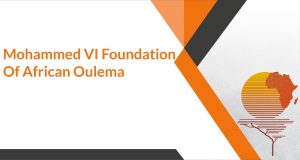Mohammed VI Foundation of African Oulema

For more than one thousand years, the Kingdom of Morocco has had links to a number of Western African countries by fundamental religious bonds, such as a common faith, madhhab and scientific references. These bonds were consolidated through the spread of Tijaniya Sufi order in these countries since the nineteenth century.
Among the fruits of this cultural-religious commonality is the lofty spiritual status enjoyed by the great imamate, the Commandery of the Faithful, amid the people of these countries, which is not in conflict with the different political systems and the historical circumstances.
These bonds have survived the political changes under colonialism and by the intellectual currents that emerged after independence.
The common religious constants in African countries were subjected to external interference in the last four decades. It has become clear to Africans, especially the religious scholars who attended the Hassani lectures in Morocco during the month of Ramadan since the sixties of the last century, that cooperation with the Kingdom of Morocco to confront the confusion of religious and denominational identity and to enlighten people in matters of religion needs the support of the bonds preserved by the Sufi orders. It became clear that this support would be secured only through a joint activity of the religious scholars. This goal was reached by the creation in 1985 of “The Association of Religious Scholars of Morocco and the Senegal”.
The Commander of the Faithful, His Majesty King Mohammed VI, decided to consolidate this cooperation through religious scholars. He thus decided in 2015 to establish the Mohammed VI Foundation for African Religious Scholars under his presidency, and appointed its founding members from thirty African countries at al-Qarawiyīn Mosque in Fez on June 14, 2016.
The Sharifian Dahir which established the Foundation states that its objectives are: the preservation of the shared faith, denomination and spiritual behavior, the dissemination of rightful canonical law, the spread of moderate Islamic thought, the revival of the shared cultural heritage and the consolidation of spiritual relations.
Since its inception, the Foundation has endeavored to open branches in various countries; in its previous sessions, it decided to organize religious scientific activities to discuss the methods of protecting religion in Africa from immoderation and extremism, and to make religious values the basis of national cohesion and of a harmonious coexistence of religious choices. The Foundation’s sessions discussed the Moroccan model of managing the religious field and the extent to which it can benefit others while taking into account the specificities of countries, their government systems and their needs.
The project was widely welcomed by the scholars, the sheikhs of Sufism and Islamic thinkers in Africa. The prevailing conviction is the expected benefit of dialogue, the exchange of experience and the creation of ways to respond to people’s religious needs by mobilizing their identity components, through the remembrance of God when doing one’s work and through working in tandem with all those who seek to do good.
